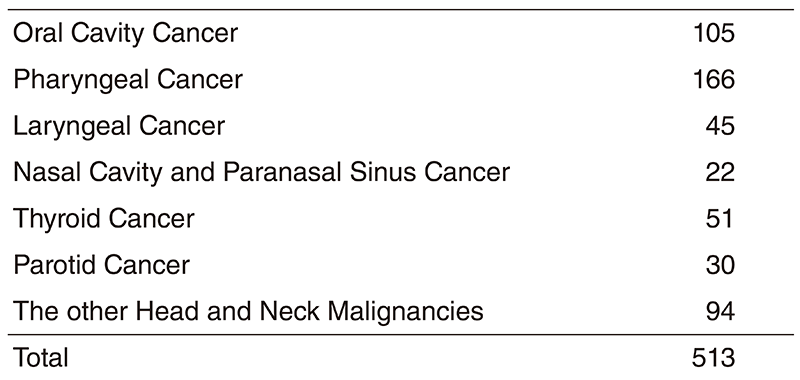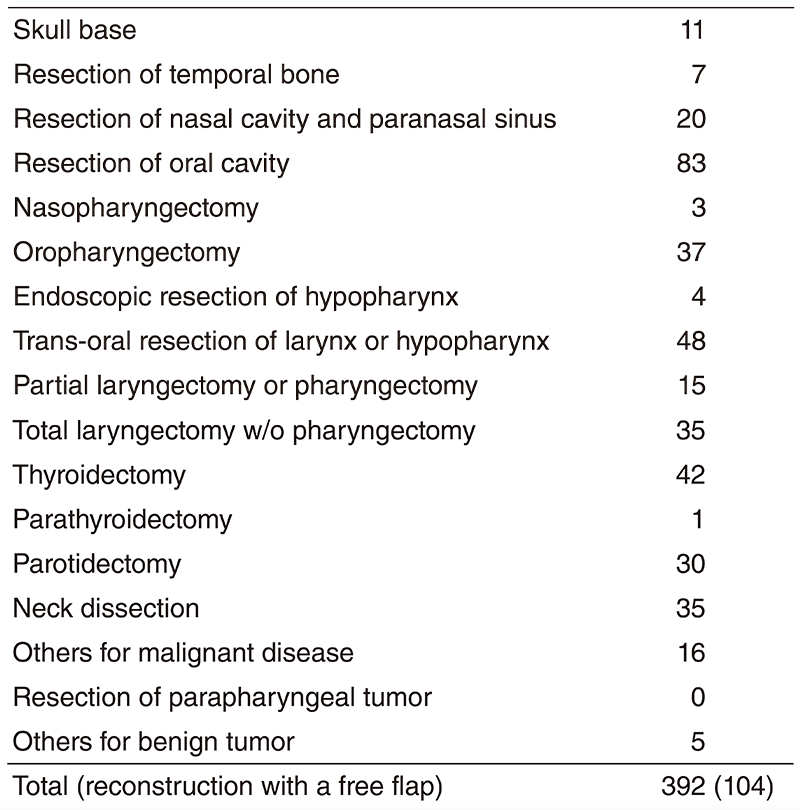Annual Report 2018
Department of Head and Neck Surgery
Seiichi Yoshimoto, Fumihiko Matsumoto, Go Omura, Kenya Kobayashi, Satoko Matsumura, Masahiko Fukazawa, Yoshifumi Matsumoto, Atsuo Ikeda, Azusa Sakai, Maki Akamatsu
Introduction
The treatment strategy for head and neck cancer is to improve the survival rates while preserving the significant functions including speech, mastication, swallowing and cosmetic appearance. In order to achieve this strategy, our department has tried to select the best treatment modality and devise new surgical procedures based on the clinic-pathological findings and our large database of the patients with head and neck cancer.
Our department has developed and performed original surgical procedures of partial or subtotal laryngectomy for newly diagnosed and radiation-failed laryngeal cancer, partial pharyngectomy for hypopharyngeal cancer and total glossectomy for advanced tongue cancer. These surgical approaches can be performed without sacrificing the larynx. Compared with the results of conventional surgery, there are apparently fewer wound complications. Patients can resume social activities more easily when they maintain their ability to communicate vocally.
The Team and What We Do
The Department of Head and Neck Surgery at the NCCH consists of eight head and neck surgeons. Many operations are performed under general and local anesthesia with or without microsurgical reconstructive surgery. In addition to radiotherapy, concurrent chemo-radiotherapy is performed with the Department of Radiation Oncology.
In 2018, 513 patients were newly diagnosed at our department. Table 1 shows the details of the patients. Among them, 392 patients with head and neck tumors underwent surgery under general anesthesia, including 104 patients with major ablations and free flap reconstructive surgery. Table 2 shows the number of surgical cases under general anesthesia.


Research activities
We are performing translational research collaborating with the department of pathology, the head and neck medical oncology, and a research institute.
Clinical trials
We took part in multi-institutional studies of sentinel lymph node navigation surgery for oral cavities and demonstrated non-inferiority compared with elective neck dissection. We also have been participating in BNCT (Boron Neutron Capture Therapy), which was successfully finished and met a primary endpoint. We are also taking part in JCOG (Japanese Clinical Oncology Group) study concerning intra-arterial chemoradiotherapy for maxillary sinus cancer and phase III study about END vs watchful waiting for tongue cancer. In addition, several global clinical trials about immune checkpoint inhibitors are ongoing in our hospital.
Education
We provide plenty of educational opportunities for resident doctors, especially focusing on acquiring operative techniques. They can learn everything about perioperative management, such as physical examination, image diagnosis, informed consent, preoperative preparation and postoperative management.
Future prospects
Trans-oral resection for superficial laryngopharyngeal cancer will be indicated for more patients. Robotic surgery is going to be introduced soon in Japan. Treatment strategy for HPV-related oropharyngeal cancer will be discussed after analyzing clinical data and obtaining the results of clinical trials. Immune checkpoint inhibitors are used for chemo-resistant patients with recurrent or metastatic tumors. We will be able to get useful information about the response rate of these drugs for Japanese patients.
List of papers published in 2018
Journal
1. Kobayashi K, Matsumoto F, Miyakita Y, Mori T, Shimoi T, Murakami N, Yoshida A, Arakawa A, Omura G, Fukasawa M, Matsumoto Y, Matsumura S, Itami J, Narita Y, Yoshimoto S. Impact of Surgical Margin in Skull Base Surgery for Head and Neck Sarcomas. J Neurol Surg B Skull Base, 79:437-444, 2018
2. Nomura T, Maki D, Kishishita S, Matsumoto F, Yoshimoto S. Oncological and Functional Evaluation of Open Conservation Surgery for Hypopharyngeal Cancer with/without Reconstruction. Int J Otolaryngol, 2018:2132781, 2018
